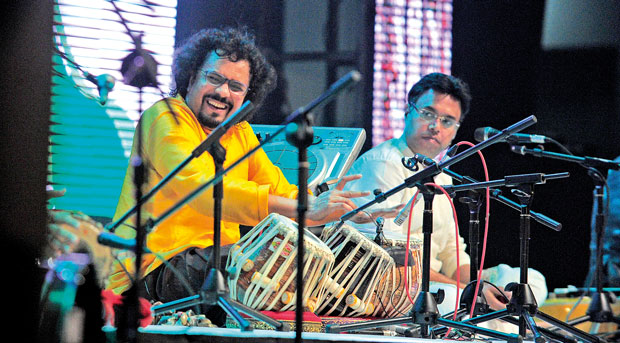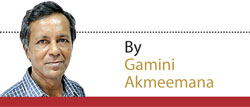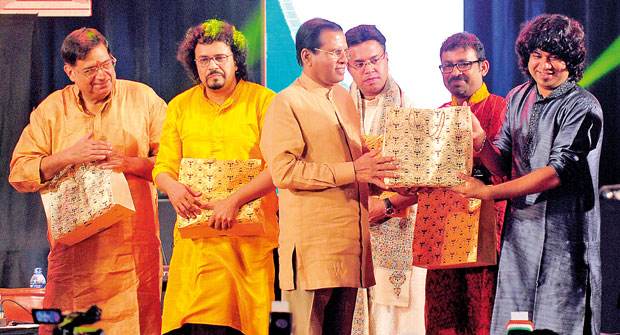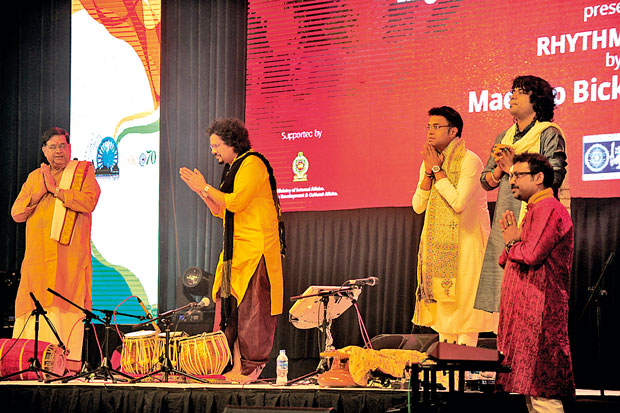Reply To:
Name - Reply Comment

 Smiling impishly, and benevolently corpulent like an Eastern Avalokiteshvara, Bikram Ghosh did all, but send up fire and smoke from his three tablas at the BMICH last evening. Invited along with five other musicians as part of India’s 70th independence day celebrations, he displayed the kind of prodigious musical energy which was a privilege to witness.
Smiling impishly, and benevolently corpulent like an Eastern Avalokiteshvara, Bikram Ghosh did all, but send up fire and smoke from his three tablas at the BMICH last evening. Invited along with five other musicians as part of India’s 70th independence day celebrations, he displayed the kind of prodigious musical energy which was a privilege to witness.
Very much in the Indian musical tradition, Ghosh, a Bengali, hails from a bedrock of musical talent – his father, Pandit Shankar Ghosh is a tabla maestro and his mother Sanjuka Ghosh is a classical vocalist. Bikram Ghosh is a musical prodigy with over 100 albums to his credit. He has composed music for 21 films and, as brand ambassador for the Indian election commission in 2011 in West Bengal, he managed to raise urban voting by a record 8.5 per cent.
The odd man out in this pleasing ensemble is the western drum set. One can successfully ‘fuse’ the guitar with the sitar, but put a drummer next to a tabla player and the former sounds flat and dull
He is an entertainer and a showman. His brand of music is called Indo-fusion and he loves experimenting, delving into rock, new-age, jazz and fusing them with Indian classical. That doesn’t please purists, but the crowds love it. On stage, he often flashes an impish, sometimes clownish, smile. He establishes a strong chemistry with the audience, invites them to clap along, and loves to talk. He takes the stage by storm.
 President Maithripala Sirisena (third from left) was a special guest at Bikram Ghosh’s show held at the BMICH.
President Maithripala Sirisena (third from left) was a special guest at Bikram Ghosh’s show held at the BMICH.
Pic by Waruna Wanniarachchi
He is articulate. An English literature graduate, he draws parallels between Indian music and Shakespeare’s iambic pentameter or Shelley’s romantic poetry. His central theme is rhythm (his band is called Rhythmscape). At the BMICH too, he delved into his pet subject. If we take Zakir Hussein, another great, internationally known Indian tabla player, the latter is reserved by contrast. Though he has forayed into fusion with John McLaughlin, Hussein as a soloist is more of a classical purist. He’s articulate enough when giving interviews, but on stage his style by contrast is reserved.
Bikram Ghosh throws both reserve and cautions into the winds. On this occasion, he was accompanied by mridangam, vocals, keyboards, drums and electric sitar
Bikram Ghosh throws both reserve and cautions into the winds. On this occasion, he was accompanied by mridangam, vocals, keyboards, drums and electric sitar. The latter is a novelty but, if guitar, mandolin and violin can be electric, there is no reason why the sitar can’t be. The only older face in this young ensemble was the great Indian master of the mridangam, Subramanium Shekhar, whom Bikram Ghosh reverently introduced as his teacher for some 35 years.
The odd man out in this pleasing ensemble is the western drum set. One can successfully ‘fuse’ the guitar with the sitar, but put a drummer next to a tabla player (as Ghosh’s own You Tube videos demonstrate), and the former sounds flat and dull no matter how brilliantly he plays, outplayed by the booming, resonating tabla. It’s an unfair match since the drum set is ideal for providing rhythm accompaniment to Western pop music (it doesn’t fuse with Western classical, either, despite various oddball experiments), but it’s flat trajectory is totally out of synch with the cyclic rhythms of Indian music.

The mridangam, on the other hand, complements the tabla well because both are ‘talking’ instruments. The tonal range of Indian percussion instruments have their vocal equivalent – ‘tha’, ‘dhin’ etc. as Ghosh demonstrated from time to time. Of course the mridangam is the more subdued partner for the tabla. It’s guttural sound is drawn inwards, while the tabla resonates outwards.
The first item was called the Dance of Shiva, based on Raag Jhor. The second, called “Little Krishna” was based on Rag Kalawathi and was “rhythmically fast and mischievous” as Ghosh put it. Actually, his entire repertoire could be described as mischievous. The third item, called Desh and based on the raga Desh, was patriotic, and sounded a little too long (patriotism, here as well as in India, can be rather long-winded). The fourth began with an invocation to the Buddha.
The final item, called “Rhythm Speaks,” was based on a raga composed by Ravi Shankar, with whom Ghosh travelled and played music for a long time. These are pop versions of the actual ragas, bringing out the creative artist and iconoclast in Bikram Ghosh.
All this was interspersed with the delightful instrumental ‘duets’ so dear to Indian musicians – tabla with mridangam, and (somewhat unfortunately) tabla with drums. The vocal accompaniment was powerful, and impressive in its effortless gliding from the bass notes to the high Cs. But the sound of Bikram Ghosh’s tablas overcomes everything else. As if this wasn’t enough, he was using an octapad, too. He even beats his own chest and slaps his cheeks for percussion effects. Once he starts, he looks unstoppable. It was a bravura performance, leaving you clamouring for more.